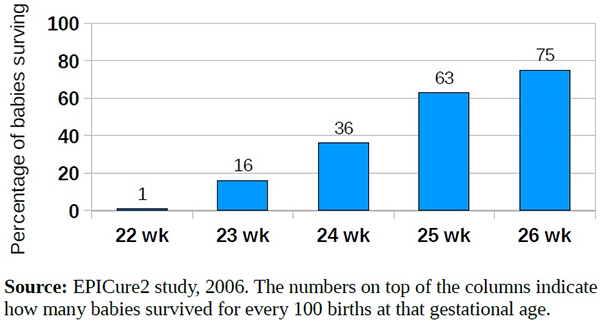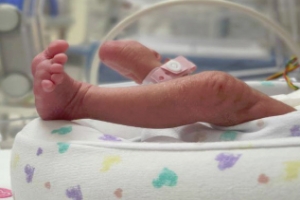The expected date for delivery, given to you by your doctor refers to 40 completed weeks. It is very normal for you to deliver a couple of weeks before or later than your due date i.e. from 38 to 42 weeks. This is called as full term pregnancy and babies are referred to as full term baby or a mature neonate. It refers to a minimum amount of time required for the fetus (unborn baby inside the womb) so as to attain reasonable maturity of body parts namely, lungs, brain, heart, intestines etc. This in turn provides them with maximum chances for smooth transition to existence outside mother’s womb.
Babies born before 37 weeks are called as preterm or premature neonate (preemies). Prematurity is the commonest cause of death in newborn babies. This is because they would not have had enough time inside the womb to attain complete development. Hence they will need extra care soon after birth. The intensity and duration of support required will depend upon severity of prematurity.
Categories of prematurity
- Extremely preterm (less than 28 weeks)
- very preterm (28 to 32 weeks)
- moderate to late preterm (32 to 37 weeks)
As per Department of Health, Abu Dhabi, infants born before 32 weeks have to be cared in level III NICU. The primary caregiver in a level III NICU must be a licensed Neonatologist. He coordinates care with help of allied specialists where applicable, like pediatric surgeons and ophthalmologist.
- previous premature labour
- Infection (Urinary tract infection)
- High Blood pressure (Pre-eclampsia)
- cervical weakness or incompetence
- abnormal shape of the womb
- Multiple pregnancy (twins, triplets etc.)
- medical condition: Diabetes, APLA etc
- too short interval in between pregnancies (<6 months)
- emotional stress
- Physical trauma
- multiple abortions
Many women have a premature birth with no known risk factors.

The above chart shows that the survival of the babies increases tremendously with each increasing week, especially for extreme preterm babies . The improved survival has been made possible by multiple interventions both before before and after birth. Therefore it is very important that at the earliest possibility of premature labour, you seek an expert opinion urgently with someone experienced in dealing with it.
As WHO has highlighted that “children are not little adults”. The differences are much more critical for preemies, due to their unique needs, vulnerabilities, and response to the environment. The symptoms in the premies are so subtle that they can be easily missed and cause grave consequences. Brain development in premature neonates is incomplete and therefore is especially susceptible to damage causing long term consequences. Premies in general are more prone to low blood sugar, temperature instability, bleeding inside the brain, and vision and hearing problems.
Common problems in premies soon after birth.
- Low body temperature, could happen soon after birth in the delivery room
- Breathing difficulty
- feeding difficulties due to underdeveloped sucking and swallowing reflexes
Dealing with the above problems and many other conditions peculiar to preterm babies, require specialized hospital set up. It includes trained and experienced doctor (Neonatologist), experienced NICU Nurses, advanced equipment etc. Transferring a preterm neonate after birth entails immense risks and can lead to several complications. Thus premature delivery must be conducted at a hospital with a team specializing in care of premature neonate.
To give the best possible start to your baby, you must prepare yourself for the unexpected event of premature delivery.
Dr. Ashwin Saboo
Specialist Neonatology
NMC Royal Women’s Hospital, Abu Dhabi
 Dr. Ashwin Saboo is a UK trained Specialist in Neonatal Medicine. He received his medical degree (MBBS) from Topiwala National Medical College, Mumbai, India in 2004 and obtained his postgraduate degree (MD) in Paediatrics in year 2010 from the prestigious Post Graduate Institute of Medical Education and Research (PGIMER), Chandigarh, India. He then, completed his Neonatology Fellowship from University Hospital Southampton, NHS Foundation Trust, UK in 2014 followed by Neonatology Bridging Program from Corniche Hospital, Abu Dhabi in 2016
Dr. Ashwin Saboo is a UK trained Specialist in Neonatal Medicine. He received his medical degree (MBBS) from Topiwala National Medical College, Mumbai, India in 2004 and obtained his postgraduate degree (MD) in Paediatrics in year 2010 from the prestigious Post Graduate Institute of Medical Education and Research (PGIMER), Chandigarh, India. He then, completed his Neonatology Fellowship from University Hospital Southampton, NHS Foundation Trust, UK in 2014 followed by Neonatology Bridging Program from Corniche Hospital, Abu Dhabi in 2016

